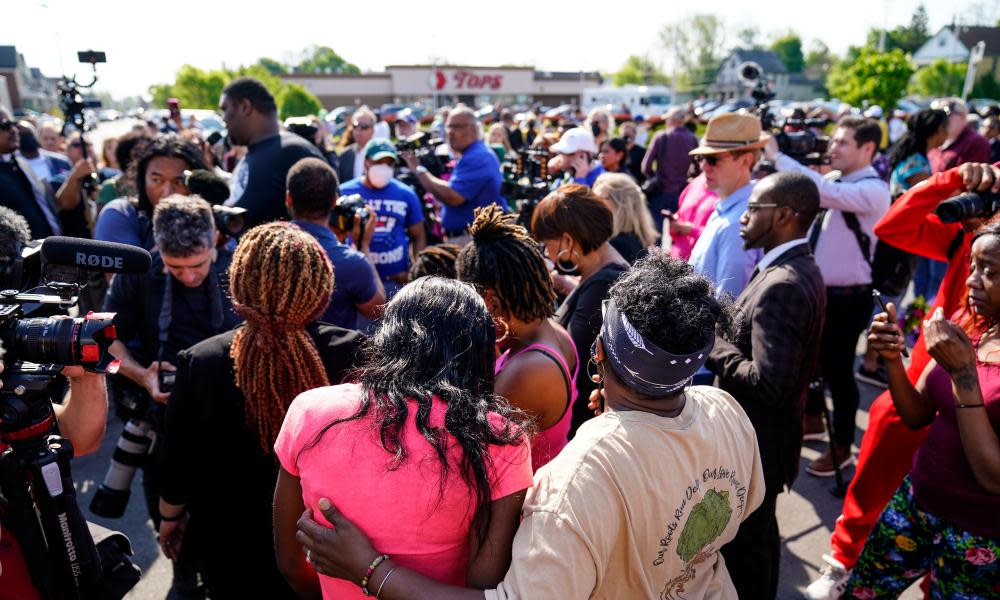The Buffalo mass shooting comes amid rise in racial violence in US

Hate-based crime has been getting worse in recent years, largely cultivated in the cauldron of darkest reaches of the internet
The story is, by now, nauseatingly familiar. From Charleston to El Paso, from Pittsburgh to San Diego, and from Christchurch, New Zealand, to the latest scene of horror in Buffalo, New York, each of these mass shootings is stitched with one common thread: white supremacy.
As investigators begin to piece together the details of Saturday’s massacre at the Tops Friendly Market that killed 10, the motivation of the murderer already seems in little doubt.
The perpetrator appears to be a radicalized, lone white gunman, filled with racial hatred fueled by extremist theory widely available on the internet, who descended on a predominantly Black community in Buffalo, New York, heavily armed and determined to kill as many people as he could.
The suspect, Payton Gendron, 18, is said to have etched a racial insult onto the barrel of his assault rifle before he live streamed himself gunning down grocery shoppers, supermarket staff and a security guard.
Authorities said he also posted a lengthy “manifesto” to social media, with frequent references to a racist “white replacement” theory as justification for what they said was a “hate crime and racially motivated violent extremism”.
Joe Biden, scores of American politicians, and community and civil rights leaders, including the Rev Al Sharpton, were quick to express their outrage, calling for more to be done to tackle the rise in hate-based crime in the US.
But it’s a problem that has been getting worse in recent years, largely cultivated in the cauldron of the darkest reaches of the internet and eagerly seized upon by those all too willing to convert the skewed ideology into violence.
The FBI reported last year that hate crimes in the US had risen to the highest level in 12 years, triggered largely by a surge in assaults on Black and Asian Americans. And while mass murders such as those in Buffalo and elsewhere understandably garner the most attention, many thousands of other violent hate-based attacks take place each year, leading attorney general Merrick Garland to make domestic terrorism and racially-based hate crimes “a top priority” for the justice department.
“Hate and racism have no place in America,” Derrick Johnson, president of the national association for the advancement of colored people (NAACP) said in a statement following the Buffalo attack.
“We are shattered, extremely angered and praying for the victims’ families and loved ones, as well as the entire community”.
The parallels of Buffalo are significant not only to the August 2019 murder of 21 people at a Walmart in El Paso, Texas, but also to countless other shootings involving a radicalized, solitary attacker.
In El Paso, the gunman, a 21-year-old white male, also posted a document online, to extremist online message board 8chan, which stated the attack in the border town was “a response to the Hispanic invasion of Texas”.
Four years earlier, an attack on a Black community church by a self-confessed white supremacist in Charleston, South Carolina, left nine dead.
In October 2018 in Pittsburgh, Pennsylvania, a white man shouted “All Jews must die” as he burst into the Tree of Life synagogue and shot dead 11 worshippers and wounded six others. Police later found anti-Semitic social media posts from the killer.
And a similar shooting occurred at a synagogue in San Diego, California, in April 2019, when one person died and several others were wounded by a 19-year-old who also posted messages of racial hatred to 8chan.
The San Diego killer claimed he was motivated by attacks on two mosques in Christchurch, New Zealand, a month earlier in which a white supremacist murdered 51 Muslims. Investigators there quickly established the killer had been radicalized online, had posted his own manifesto of hate and live streamed the killings.
To Sharpton, the veteran civil rights activist and television host, the latest attack in Buffalo is an urgent call to action.
“President Biden should have a White House meeting of Black, Jewish, and Asian leaders to underscore the federal government’s escalating efforts against hate crimes,” he said in a tweet.
“These hate crimes need to be met with a united front against hate-based violence.”
The mayor of Buffalo, meanwhile, said on Sunday he believed the murders in his city will prove “a turning point”.
“I would like to see sensible gun control. I would like to see ending hate speech on the internet, on social media. It is not free speech. It is not the American way,” Byron Brown said on NBC’s Meet the Press.
“We are not a nation of haters. We are not a nation of hate. We need to send the message that there is no place on the internet for hate speech, for hate indoctrination, for spreading hate manifestos.
“I will be a stronger voice for that. I believe that what happened in Buffalo, New York, yesterday is going to be a turning point. I think it’s going to be different after this, in terms of the energy and the activity that we see”.

 Yahoo News
Yahoo News 
